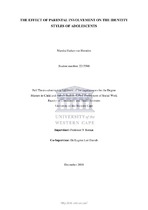The effect of parental involvement on the identity styles of adolescents
Abstract
Adolescence is a phase when youth engage in risk-taking behaviour, which could result in poor physical and psychological adjustment. Risk behaviour is a result of poor decision- making. Decision-making is associated with exploration and commitment, also referred to as identity styles. During the phase of developing an identity style, parenting is challenging; however, research reveals that parental involvement, as well as a more positive approaches to parenting, have been observed to influence child behaviour and outcomes. For parenting and identity styles, this is not very clear. Therefore, the aim of this current study was to assess the effect of parental involvement on the identity styles of adolescents. The study employed a quantitative, cross-sectional, correlational research design. The respondents were conveniently sampled. The final sample was Grade 10 learners in the Metro East Education District, with a mean age of 16.01 (SD=1.04). Data were collected through a self-reported questionnaire, which comprised three parts: demographic details of participants, Parent Involvement Mechanisms Measure, and Identity Styles Scale. Data were analysed using the Statistical Package for the Social Sciences (SPSS). The results revealed that informational identity style was the most prevalent identity style, which was significantly and positively predicted, with 18% of variance. For mothers, maternal modelling and maternal instruction significantly predicted the informational style. For fathers, paternal reinforcement significantly and positively predicted commitment style, with 14% of variance. Recommendations are provided based on the findings of this current study.

